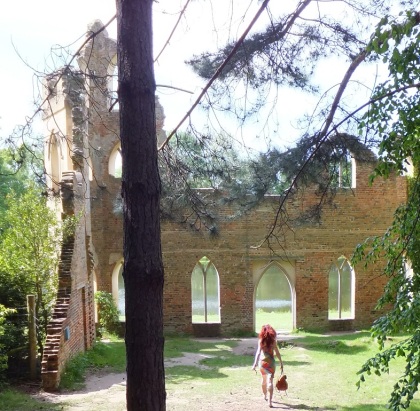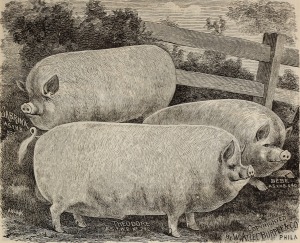 A report of the Frankfurt Book Fair in The Hot Sheet caught my eye this week, and I have to admit it’s got me a trifle narked. See what you think.
A report of the Frankfurt Book Fair in The Hot Sheet caught my eye this week, and I have to admit it’s got me a trifle narked. See what you think.
‘The acceptance and progress of self-publishing (or, rather, the sluggish acceptance and progress) in most countries (the US, the UK, and Germany are the exceptions) was probably best represented by Guillaume Dervieux, vice president and CEO of France’s Albin Michel publishing house. He said that self-publishing is all but anathema to “what we are doing” in the trade. In self-publishing, he said, every manuscript “is accepted and each title is invested with the minimum amount of means. We do exactly the contrary. We reject a lot of manuscripts, and we concentrate all our means and effort only on the ones we choose with passion.” ‘
Oof. (Before we go any further, let me state that I find The Hot Sheet to be a useful, worthwhile round-up of news for authors. I’ve found several important opportunities because of it. They are reporting attitudes they have observed, not their own attitude to self-publishing. That’s why I included the paragraph in full.)
Back to Mr Dervieux. Here’s the point that worried me. In self-publishing, every manuscript “is accepted and each title is invested with the minimum amount of means”.
Here are some sows, with ears.

There are many authors (indie and otherwise) who’ve sought my editorial input on a book and been sent back to the drawing board – kindly, with constructive directions. That’s what they hire me for. Some of them come back with a greatly improved script.
Anyone who’s hung around this blog will know that I frequently post about the long process of getting a manuscript right. The time taken to edit for nuance. You’ve also heard me plead for writers not to rush because we can set our own deadlines, and that is our great artistic advantage, if we want it. A book will be out for ever, and although we can nip into the back channels and edit the snarlies, we can’t edit a reader’s memory of a bad experience.
But here’s something I’ve never talked about – the care that then goes into the editorial and production process – which I think is one of Mr Dervieux’s contentions.
So, by way of example, let me take you through the editorial process for my latest book, Not Quite Lost.
For reference, Not Quite Lost is about 38,000 words.
- Rewriting/developmental editing December 2016 to April 2017
- First beta reader April 2017
- More drafting, second beta reading, start of June 2017
- More drafting, third reading, end of June 2017
- Final drafting
- Copy editing, proofing and formatting to August 2017
In parallel with this, the cover was being developed. Work on that began in January 2017. Three full designs were considered and discussed with close advisers. The final design emerged in July 2017.
And no publishing job has been done properly unless there is marketing and publicity. Preliminary work on that began in May, with 3 weeks of campaigning in August, and work is still ongoing as leads arise.
To recap, the production calendar looked like this:
- Conceptual and developmental editing from first draft to final manuscript 7 months
- Proofing & formatting 2 months
- Cover development 7 months
- Marketing/publicity 4 weeks concentrated work, then as needed
Of course, these months weren’t exclusively spent on the one task. I was doing other work in between, just as a traditional publisher would. And the breaks allowed time for new ideas to present, minds to be refreshed and new possibilities to be considered.
This is not the schedule of a book that was ‘invested with the minimum amount’, either financially or in terms of time. Indeed, I’ll wager my book had more care than it would get in a traditional publishing house. How do I know this? Because I’ve worked for them as well. Here’s a post that discusses some of the quality compromises I’ve seen in traditional publishers.
I’m heartened that Mr Dervieux chooses his projects carefully and invests each one with utmost effort. I would hope for nothing less. I hope it’s clear that I, a self-publisher, take just as much care.
Here are those pigs again.

What of Mr Dervieux’s first point, that plenty of self-publishers put sows’ ears in the sewing machine? Bien. Before I decided Not Quite Lost was fit to publish, I tried to find people to talk me out of it. Like a publisher with their editorial board. The story of that is here. And were they right to let me go ahead? The reviews can do the talking.
I realise this post has become a little ratty.

Apols, people, but Mr Dervieux’s generalisation is wildly unfair. It’s as bad as dismissing all of traditional publishing as ghostwritten celeb books or Dan Brown trudge with copycat covers and slapdash editing. Yes, of course, everyone’s mileage varies, and anyone and everyone can self-publish. Yes, self-publishing is done by amateurs. It’s also done by responsible, professional authors who nurture a book properly and take care in its production to create a book that’s worth a reader’s time.
Some of us would say that’s what it’s all about.
Thanks for the ratty, Mrs Airwolfhound on Flickr


Perhaps I’ve mentioned this before, but overall I’ve noticed a decline in editorial quality — mostly in the sense of copy-editing and proofreading — from the “major” publishing houses, over at least the last twenty years. One would like to give M. Dervieux’s house the benefit of the doubt; it may be he does things differently, and if so, kudos to him and his. I read something recently contending that major houses, instead of building up a solid stable of mid-list authors, tend to go after the next big best seller. Again, M. Dervieux may have a different policy. I do find his statement that “we concentrate all our means and effort only on the ones we choose with passion” somewhat irritating, though. Any serious writer with professional instincts, self-published or not, does exactly that when they start developing story ideas, and it’s only the ones that arouse “passion” that get put down on paper.
Besides, haven’t we been hearing this meme from publishers for the last five to ten years? In some variation or another? I also found his use of the phrase “all but anathema” interesting because it seems a bit strongly-worded. Perhaps his passions carried him away.
Hi Tom! I’ve also seen those signs – publishers shifting away from midlist authors; editorial standards slipping. A friend behind the scenes has pointed out that the French publishing industry doesn’t have much of an indie sector, which might explain his perspective. In that case, if he didn’t know much about it, why was he commenting on it?
As you say: carried away with all that passion, perhaps.
I put my soul into my books. Apparently that means nothing. I am reminded of the line from Yeats’ poem He Wishes for The Cloths of Heaven- “But I, being poor, have only my dreams. Tread softly for you tread on my dreams.” Gee. One day I believe that publishers will see their slush piles diminish to almost nothing, and submissions (what a concept) dry up, because they treat writers not like sows with silky ears but as cash cows sacrificing ourselves for their benefit.
I will not say the words that sprang to mind.
Hi Viv! I know you’ve been in this a long time and have weathered several ups and downs. I’d also like to let people know that you were at one point in serious talks with a publisher about one of your manuscripts, so you’ve seen this up close.
We creatives are in a curious position. What we do arises from a genuine place. Then it tries to find a way to get to readers, which means aligning with markets and all this strange business of flirting with publishers. Some of us end up very battered. But I didn’t mean this to be a depressing comment and I’m pleased you stopped by and joined in. Hugs.
Ah, ignore me, I”m the perpetual Eeyore these days. Everything depresses me. For the record, there were a series of close encounters of the publishing kind and I even had an agent for about two years before he chose to stop answering letters and calls. It still rankles how cavalier the so-called professionals can be about the people who actually power the industry, for without the hopes and dreams of writers, even shitty ones, there would be no industry.
The irony is that the very sensitivity that makes a writer hold insights that fill a work with authenticity is the thing that will destroy some of us if we don’t step back.
I had similar treatment. I had several agents. Eventually I wrote to them to formally sever our agreements, they never even acknowledged them. I thought the business ran on relationships, but it seems they were sending a clear message about which relationships mattered and which didn’t.
These are horrible experiences. I have harboured a hope that one day I’d be terribly successful and both publishers and agent would be writing regretful articles for the online papers. I suspect that is probably whatever is the opposite of schadenfreude, and, improbable.
My biggest issue with the original article is the generalisation (as others have remarked).
Reblogged this on Chris The Story Reading Ape's Blog.
Thanks, Chris!
Welcome, Roz 😀
I agree–massive generalization. Some indie authors take tons of care, as you clearly do, some rush it right out, and everything in between. As a traditionally published author, I do find the timetable longer than any indie timetable I’ve seen–but that’s as much a function of having multiple books on a list as of applying additional care.
The real difference between indie and trad, and I do think it’s a significant one that should be recognized so its accompanying drawbacks can be overcome, is that as a trad author people are paying you for the privilege of investing time in your book. As an indie it’s the opposite–you pay people (editor, cover designer, layout, PR, etc.) to invest time in your book.
That can be perfectly fine. You can get a great result. But you can also get a poor one simply because the dynamics are antithetical. And the best indie books I read seem to be by authors who recognize the inherent risks and ways to compensate.
Hi Jenny!
It’s interesting that you raise this question of who funds the editorial process. And yes, when you go with a traditional publisher, money flows towards you, not the other way round.
But actually I believe the author pays for it in the end – a traditionally published author gets a much smaller royalty because the publisher is investing up front. There are other contributions the publisher should make too, such as kudos and contacts with reviewers – the kinds of thing that are difficult to put a price on. It’s not a simple equation.
And you’re right to point out that self-publishers make all the decisions, which means they might make bad decisions about who to hire. It’s a minefield. But if you make good decisions, and luck is on your side, you might have a very good result indeed.
I think that the reader should be the ultimate judge of what the public wants. So many large publishing houses believe they should decide what the public reads. The bottom line for the company is what they can most easily market and sell. I feel that the consumer has the right to decide on the value of a book, whether it be self-published or traditionally published.
I so agree – the only way to judge a book is by reading it. Not pre-judging it by the method of publication.
Well said, Roz. This fight between traditional and Indie is becoming more polarised by the day. The truth is that good stories are produced by both camps, and in 100 years time, no one will care how they came into being, only that they /are/.
Thanks, Andrea! I hope it happens a bit sooner than that, though…
lmao – yes, well…I wouldn’t mind either, now you mention it!
I agree with Tom’s remarks above. I’ve been writing over three decades, professionally published by Penguin, Random House etc along with smaller houses. I’ve also worked as a professional publisher. There’s no question that cost-cutting has reduced the degree of editorial work available in most books (reduced cycles of proofing, particularly and/or going for cheaper proof-reading services – ‘outsourcing’ being a standard business model for all houses). Changing market styles has also led to mid-list authors being ditched and a focus on what will sell in significant bulk, which reduces the ‘texture’ of a publisher’s list but does improve the bottom line. I think it’s only partly been driven by the democratisation of publishing via Amazon and other online services; there’s also a social change and a change in cultural style that this reflects, likely generational.
I think there’s a perception (certainly within the professional publishing industry) that self-published means amateur; and to some extent that’s also true – there is a lot of rubbish out there. But as you point out, a properly self-pubbed book takes as much investment of time and expertise as those produced by the commercial houses. And with reason: the requirements for quality are the same, and it’s up to the individual author to find ways of achieving those. On my own experience, I think it’s quite feasible to develop the skill-set for the editorial work (including judgements over who to hire for proofing, page design and so forth) – the main stumbling block remains marketing and sales, in which the main ‘named’ publishing houses usually have an advantage simply on the back of scale, repute and marketing budgets.
Matthew, it’s excellent to have your perspective here. I agree that the hardest part of the equation now is marketing and sales. Indies struggle to make the contacts to get publicity for their books, though I managed to make a few surprise hits with Not Quite Lost. Hiring a specialised PR company can help, but of course you need the budget for it. We’re also at a disadvantage not having a sales team. Selling into bookshops is labour intensive.
I’d also add distribution to your list. Print on demand doesn’t work well for bookshops. And I’m finding that they’re often reluctant to let customers order a POD title even for a confirmed sale.
Reblogged this on Notes from An Alien and commented:
Here’s the link to the book Roz talks about in today’s re-blog:
Reblogged this on and commented:
This is an excellent, topical post that all published and self-published authors should take note of.
Thanks!
I think the problem is that some in the trade publishing business only compare the best of trade publishing with the worst of independent publishing. Their mind is stuck in a track and see only that. It’s like comparing a top pop star with me singing in the bath. The reality is that the best of independent publishing matches any other quality bar, but with blinkers on they don’t see that. But one day they will die out if they don’t adapt. It’s a topic I wrote about at http://www.karldrinkwater.uk/2016/05/a-world-of-writers-and-readers.html
Hi Karl! Precisely. And good selfpublishing will often use exactly the same production personnel as traditional publishing, which suggests they’re not so different.
Thanks, Roz for this helpful information.
And thanks for stopping by, Patricia!
Excellent post Roz. There are excellent books from both Indies and trads and there are good and bad with them both, so I look forward to the day we are not all lumped together as Indies who just put out books without the painstaking steps involved. My re-writes and edits take far longer than it takes me to write a book too. 🙂
Hi Debby! Precisely – judge us by the quality of our books, not the way they came to the market.
Absolutely Roz. But sadly, I think we still have a ways to go.
It’s a good thing that most of us don’t have to care what narrow-minded thinkers like Dervieux have to say. Now we can let the readers decide who is worthy, rather than self-important industry gatekeepers. Most likely, Dervieux is parroting the industry attitude about self publishing because it cuts into his profits. Follow the money, and you will find the motivation.
Precisely. And : hello Daniel!
Wonderful post and I completely agree. It’s taken nearly twenty years for me to hone my writing skills to a point where I can even think about selling. My current project has so far clocked up twelve months of development. I think the trad publishing industry does not yet realise indie publishing is growing up, that many self-published writers now see themselves as a business, and in business, quality counts. If you want to stick, you have to take the job seriously, do it right, and do it well. Unfortunately, customers or consumers have a much longer memory for the bad, which in turn tarnishes the good. The only thing to do is encourage the production of quality material and in time attitudes might change. I choose to put a positive spin on it. If trad publishers are so obsessed with denigrating indie authors, it means they are scared of the competition.
Thanks for such a thoughtful comment, Katia! I agree that trad publishing doesn’t realise we’ve grown up. They’re used to regarding authors as cogs in the machine, not as writer-directors who can take charge of the process and think outside the one role.